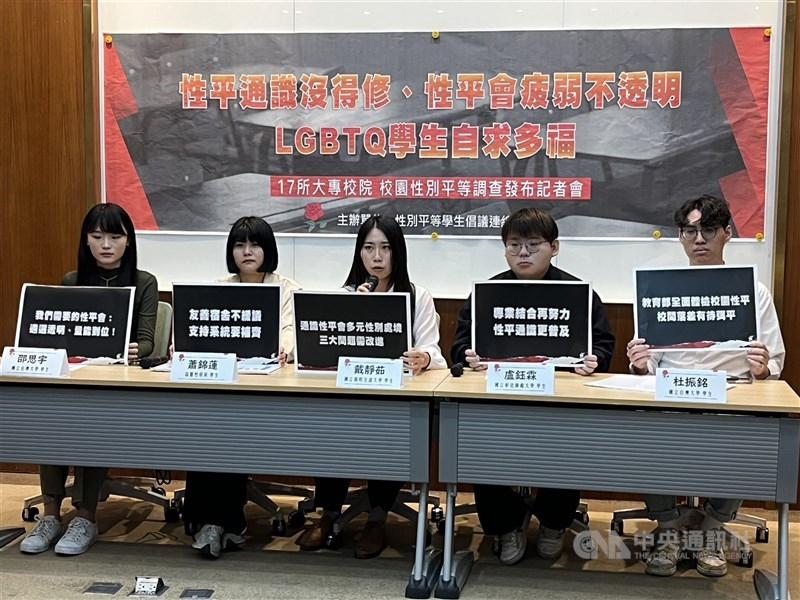Universities across Taiwan fall short on LGBTQ+ support, transparency, and gender-equity staffing, survey finds
Taiwan is often hailed as a leader in LGBTQ+ rights in Asia, notably becoming the first country in the region to legalize same-sex marriage. However, a new report from the Student Alliance for Gender Equality paints a less progressive picture when it comes to gender equity within Taiwanese universities.
Released just ahead of Gender Equity Education Day (April 14), the survey—conducted across 17 public and private universities—shows that none fully met basic requirements in gender equity implementation, ranging from committee transparency to LGBTQ+ student support, highlighting a growing disconnect between national progress and on-campus reality.
🔍 Key Findings: A System of Silence and Opaqueness
The report found that:
- No university allowed student participation in selecting gender equity committee members.
- 10 universities failed to disclose selection criteria for these committees.
- Only 2 schools publicly listed members’ stances on gender equity or relevant experience.
- 6 universities had no full-time staff dedicated to gender equity work.
- Just 4 out of 17 institutions provided anonymous discrimination reporting channels.
This paints a troubling picture of a system that exists on paper but often fails in practice. Gender equity committees, legally mandated under Taiwan’s Gender Equality Education Act, are supposed to safeguard students, but the reality appears far from ideal.
🏳️🌈 The LGBTQ+ Experience: Discrimination and Discomfort
The report highlights real-life testimonials that bring raw urgency to the statistics.
“A nonbinary student told us they were publicly asked by a teacher, ‘Are you a boy or a girl?’” said Lillian Hsiao, a graduate student at Kaohsiung Medical University.
“The class laughed, the student froze—and they didn’t know where to report it or if doing so would affect their grades.”
Such incidents underscore the lack of gender awareness among faculty—a direct violation of Article 20 of the Gender Equity Education Act, which requires teachers to eliminate stereotypes and avoid discrimination.
🛏️ Dorm Disparity: Trans Students Left in Limbo
Housing policies remain another weak link. Only six universities offered gender-inclusive dormitories, and 14 had no clear transfer policies for transgender or gender-diverse students.
“There’s often no contact person, no procedure, and no answers,” said Josephine Tai of National Yang Ming Chiao Tung University.
“Students are left to navigate a confusing and emotionally draining process alone.”
⚖️ Ministry of Education Responds: Too Little, Too Late?
In response, Wu Lin-hui of the Ministry of Education’s Department of Student Affairs and Special Education acknowledged staffing gaps and said the ministry had issued notices urging universities to prioritize full-time gender equity officers.
But Wu also pointed to university autonomy and regulatory gaps, particularly around dormitory design, as limitations on government enforcement.
🧠 Original Analysis: Why It Matters
This issue is not about ticking off compliance boxes. It’s about building campuses where students of all gender identities can feel safe, respected, and empowered.
Despite Taiwan’s outward progressive stance, institutional inertia threatens to roll back hard-won rights. Universities are supposed to be incubators of inclusivity, not places where outdated gender norms and bureaucratic red tape stifle progress.
The data shows that policy implementation is dangerously uneven. With some universities performing significantly better than others, a nationwide benchmarking system and transparent reporting standards may be necessary to hold institutions accountable.
📌 FAQs
What is the Gender Equality Education Act in Taiwan?
It’s a law mandating schools to establish gender equity committees and foster a safe, inclusive environment for all genders, including sexual minorities.
Are all universities required to have full-time gender equity officers?
Not yet. While the Ministry of Education recommends it, staffing decisions fall under university autonomy, and many still assign such duties to part-time staff.
Why are gender-friendly dormitories important?
These dorms ensure that transgender and nonbinary students have a safe and comfortable living environment, which is essential to mental and academic well-being.
What are anonymous reporting systems for?
They allow students to report discrimination or harassment without fear of retaliation, and are critical for upholding gender equity in a safe manner.
What is the government doing to improve the situation?
The Ministry of Education is pushing universities to increase staffing and adopt more inclusive policies but has yet to implement binding regulations.


